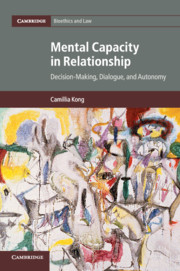Book contents
- Mental Capacity in Relationship
- Cambridge Bioethics and Law
- Mental Capacity in Relationship
- Copyright page
- Dedication
- Contents
- Acknowledgements
- List of Statutes
- List of Cases
- 1 Problems with Mental Capacity
- 2 Mental Capacity, Legal Capacity, and Relational Rights
- 3 Relational Autonomy and the Promotion of Decisional Capacity
- 4 Procedural Reasoning and the Social Space of Reasons in Capacity Assessments
- 5 Ethical Duties of Support and Intervention
- 6 Hermeneutic Competence and the Dialogical Conditions of Capacity
- 7 Rethinking Capacity
- Appendix 1 Overview of the Mental Capacity Act 2005 and Inherent Jurisdiction in England and Wales
- Bibliography
- Index
- Series page
- References
Bibliography
Published online by Cambridge University Press: 04 July 2017
- Mental Capacity in Relationship
- Cambridge Bioethics and Law
- Mental Capacity in Relationship
- Copyright page
- Dedication
- Contents
- Acknowledgements
- List of Statutes
- List of Cases
- 1 Problems with Mental Capacity
- 2 Mental Capacity, Legal Capacity, and Relational Rights
- 3 Relational Autonomy and the Promotion of Decisional Capacity
- 4 Procedural Reasoning and the Social Space of Reasons in Capacity Assessments
- 5 Ethical Duties of Support and Intervention
- 6 Hermeneutic Competence and the Dialogical Conditions of Capacity
- 7 Rethinking Capacity
- Appendix 1 Overview of the Mental Capacity Act 2005 and Inherent Jurisdiction in England and Wales
- Bibliography
- Index
- Series page
- References
- Type
- Chapter
- Information
- Mental Capacity in RelationshipDecision-Making, Dialogue, and Autonomy, pp. 241 - 250Publisher: Cambridge University PressPrint publication year: 2017



